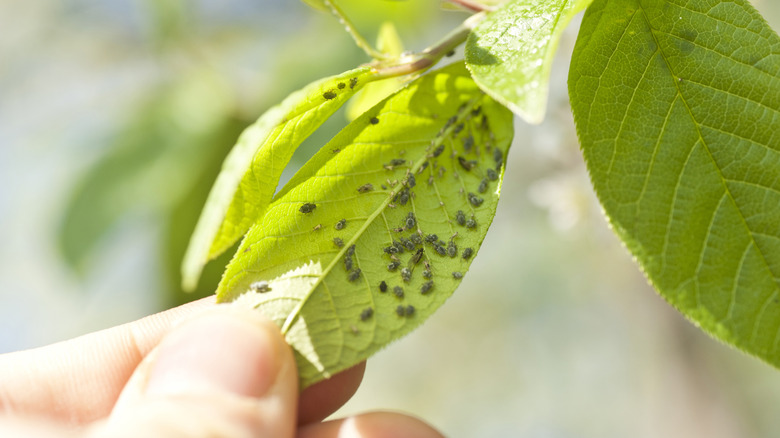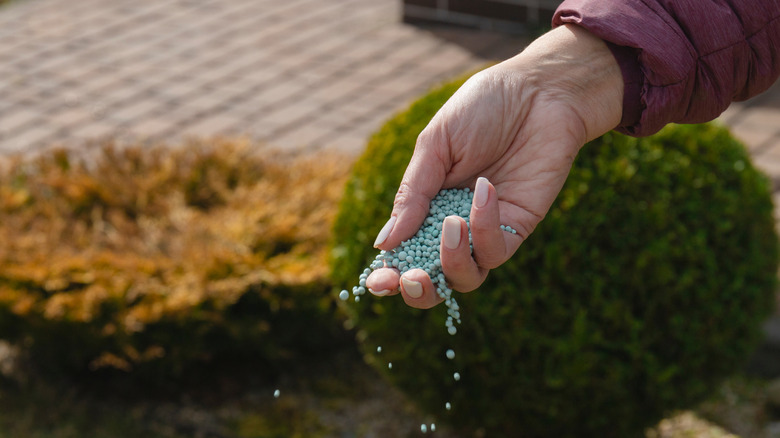This May Be The Real Reason Your Plants Are Covered In Aphids
We may receive a commission on purchases made from links.
Aphids, aphids everywhere! Getting rid of annoying aphids is a persistent problem for gardeners across the world. Even if you want to suspect that they come flying in from your neighbor's yard, there is a deeper cause behind their infestation that you are probably ignoring. Granted, there may be other reasons for aphids' appearance, such as distressed plants or natural stages of their own life cycle, but if you are facing a sudden torrent of aphids in your garden, there's a possibility that you have over-fertilized your soil with too much nitrogen.
Aphids are soft-bodied, pear-shaped, piercing-sucking insects that exist in a range of colors and have the ability to grow exponentially during summers. Although aphids may not always severely damage plants, they can cause stunted growth, yellowing of foliage, dead shoots, and curling of leaves when left unchecked. However, what is astounding is the fact that a significant number of their characteristics are determined by the nitrogen content of your soil. This includes features like their size, color, fecundity, longevity, and even their reproductive phase. For instance, aphids feeding on a nitrogen-heavy phloem sap are often darker and bigger. But how exactly does this seemingly distant correlation pan out? Let's find out.
The effects of high-nitrogen fertilizers attract aphids
While you might think it helps your plants recover, over-fertilizing is one of the big mistakes everyone makes when dealing with aphids in the greenhouse or garden. In fact, direct correlations have been found between nitrogen content of fertilizers and aphid infestations on plants. A study conducted by the Journal of the Saudi Society of Agricultural Sciences on citrus orchards found that increasing the nitrogen content of the soil by three times also increased the vegetative growth of the plant — and tripled the population of sap-sucking aphids as well.
When the soil is heavy with nitrogen, plants grow rapidly. Consequently, their cell walls become thinner, more elongated, and easier for aphids to penetrate. This is also why you often find more aphids sticking underneath young leaves and around developing stems and twigs of seedlings. These immature regions experience very high rates of growth and are full of nitrogen-heavy cell sap. Restricting the use of highly-soluble nitrogen fertilizers is, therefore, a no-brainer for controlling aphids.
Use natural and slow-release alternatives to prevent aphid growth
Instead of heavy fertilizers, you can use natural composts or urea-based fertilizers to enrich your soil, as they do not dump enormous quantities of nitrates. You can also try slow-release fertilizers instead of fast-release ones to achieve the same purpose. A lot of these slow-release formulations, such as Osmocote Smart-Release Plant Food Plus Outdoor & Indoor₁, come in an encapsulated form which prevents a sudden overdose of nitrogen to the soil. Furthermore, instead of dumping a single heavy dose of fertilizer at once, consider staggering your fertilizer application, with multiple doses of lower concentrations, to check the corresponding aphid outburst.
You can also try some organic fertilizers in spring on your lawn or garden, since they are gradual and sustained in their effects as well. However, there can be some variations in the rate at which different organic fertilizers release their nutrients. For instance, fish emulsion is far quicker in its effects when compared to a plant-based compost. Keep in mind that organic fertilizers can also be a little heavier on your pocket per pound of nutrients when compared to their synthetic counterparts.
Interestingly, natural nitrogen fixation has also been found to actively prevent aphid growth. A study conducted by Penn State entomologists found that soybeans that used naturally-occurring rhizobia for their nitrogen intake were infested with fewer aphids compared to the varieties that were treated with artificial fertilizers, although the reason behind this isn't fully understood. For a fertilizer-free solution, consider planting nitrogen-fixing herbs to naturally enrich the soil.


